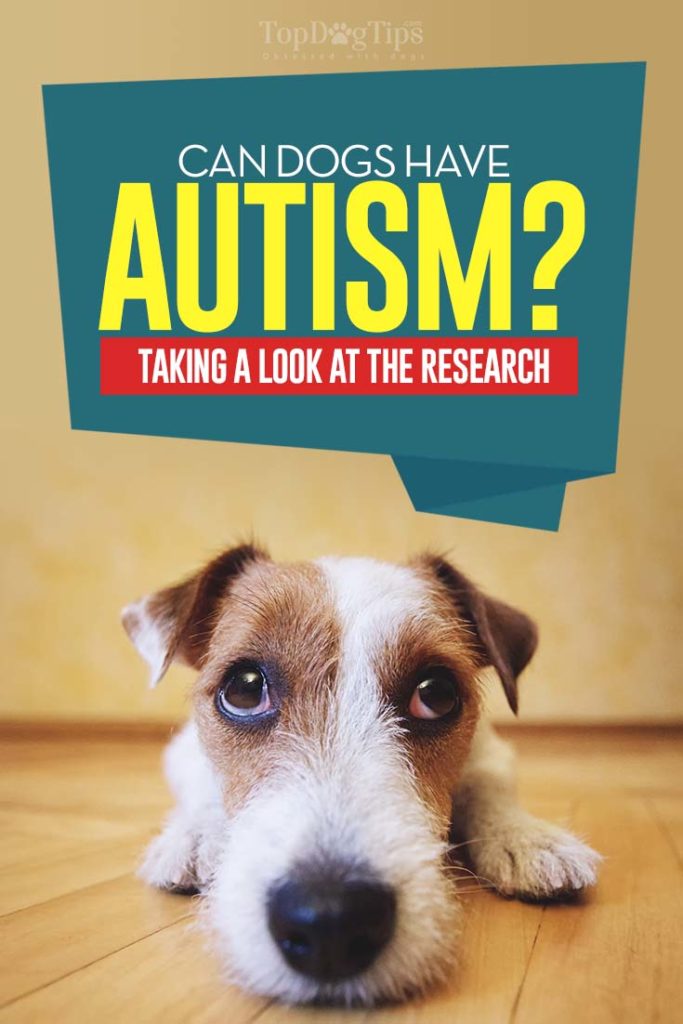
Table of Contents
Dog behavior is almost as complex as human behavior, although much of it is innate. Their emotions are a mystery to us, but as pet owners, we'll often suspect conditions in dogs that are similar to humans, such as dog autism. But can dogs have autism, and what do experts say?
The real answer is—we don't know. Dog autism has been studied since the 1960s, yet we still have no certain answer to this question.
However, while there is no clear science yet on this, some evidence shows that it's possible for a dog to have autism based on what we have from human research, particularly in autistic kids. But there's a lot more to this, and dog autism could, in fact, be a real condition. The answer to the question, “Can dogs have autism?” lies somewhere in our understanding of dogs' behavior better, so let's start there.
Understanding Your Dog's Behavior
Studies show that our canine friends can suffer differing emotions that are very similar to our own feelings. Watching your pet pooch, once you get to know their individual traits, you will start to notice when they feel happy or fearful. Dogs may even have a sense of humor, scientists say. In fact, there's some research that states how dogs can laugh and smile too, according to Psychology Today.
To some extent, their bodies function similarly to humans in that they produce hormones and chemicals that help determine their moods. Some studies have shown they even have the same production of the famous love hormone, oxytocin, which is the reason we experience the feeling of affection for puppies and the majority of animals.
With a better understanding of our dog's general social behavior and emotions, we are able to deduce and compare how closely their reserved and unsocial behavior resembles autism, including any similar signs we see in autistic kids. Below is what I've found on what scientists have already researched and what they believe about dog autism.
ALSO READ: 5 Psychological and Behavioral Signs of Dog Abuse
Can Dogs Have Autism?
How Autistic Dogs Would Behave
Autism is a developmental disorder affecting the subject's communication and interaction. It's likely you've noticed your dog shying away from you or being closed off, and now you wonder, can dogs have autism, and what can you do? Let's take a closer look at this.
It's clear that there are a lot of similarities between humans and dogs when it comes to emotions and the state of mind. This is crucial to understand before we can effectively answer whether dogs have autism and how this condition manifests itself in canines. It's also important to know a dog's way of communication, which is intrinsically related to a potential dog's autism condition.
For example, most recent studies found that dogs do, in fact, communicate to us using their facial expressions, which is how dog autism would be expressed. Other studies have also proven that certain hormones can cause aggression in dogs, and a similar pattern can be observed in other canine behaviors, such as autism.
There are certain patterns to understanding your dog, in particular, his facial expressions and body language. Dog sounds and vocal communication must also be factored in. But much of your pooch's communications comes through its tail, such as:
Speed
- This indicates how happy they feel. The quicker the wag, the more excited they are.
- A slow wag can be a sign that the pooch is unsure of a situation.
Position
- Straight and horizontal in position can mean the pooch is alert and assessing a situation;
- Held straight but higher, he leans towards the pooch, showing signs of aggression. It could be that your dog feels threatened.
- Almost vertical means the pooch thinks he’s the dominant one.
- The lower the tail drops, the more submissive they are.
- Tucked under the body is full submission and worry.
But what if your pet dog is behaving more withdrawnly? You are sure that your pooch is not unhappy at home, because he is well loved by the family. These symptoms of what appears to be sadness could mean that the dog is suffering from a developmental syndrome or cognitive dysfunctions. It's not the emotional mish-mash of hormones.
Research with autistic kids
In human children, if a child is not communicating or interacting as well as they should for their age, specialists will assess the kid for autism. Diagnoses of autism in kids depend much on where they are on the spectrum. The results will define how well a child can live a what we would classify a “normal” life.
Diagnosis of autism is carried out by testing, like for any other neurodevelopment disorder. The child is assessed on how much they socially interact and how they behave in social groups. They will also assess whether the kid has developed any repetitive behavioral patterns.
EXPERT INTERVIEW: What is Dog Psychology?
Dogs and Autism: More Studies
 The evidence on autism in dogs is patchy at best. Some studies seem to show that similar symptoms of autism are present in dogs. Patterns such as repetitive motor behaviors are often a symptom of autism in people, and it may show in a dog in various ways, such as:
The evidence on autism in dogs is patchy at best. Some studies seem to show that similar symptoms of autism are present in dogs. Patterns such as repetitive motor behaviors are often a symptom of autism in people, and it may show in a dog in various ways, such as:
- Flank suckling is common with Dobermans.
- Tail chasing is common in bull terriers.
A genetic condition, Fragile-X syndrome, is common in people with autism. In people, this presents itself as a prominent forehead, large ears, a long face, and a high-arched palette. You could argue that these features are similar in a Bull terrier. Does that make them more liable to suffer autism?
In 2014, The American College of Veterinary Behaviorists discussed similar investigations. There, they referred to a study carried out on Bull terriers. It had highlighted the repetitive signs of tail-chasing. The dogs that compulsively acted in such a way were also noted to be socially withdrawn. Plus, they struggled to follow training instructions. It was more common in males who also showed aggressive tendencies. Experts have long suspected that such behavior is similar to that of autistic children.
There is another ongoing study that specifically looks at autistic kids and dogs that have been presumed to have dog autism. We haven't seen any conclusive results on this yet, but the scientists are attempting to provide a better answer: can dogs have autism, or is that simply something we're incorrectly assuming based on what we see in kids?
The bottom line
Can dogs have autism? We don't know. It's possible for dogs to be autistic, but more evidence is needed to confirm the many hypotheses that have been proposed by scientists since the 1960s.
ALSO READ: Science of Human-Dog Psychology – Are You and Your Dog a Good Match?
10 Signs of Dog Autism
Going on the assumption that dog autism is, in fact, real, these could be the indicators that your dog has a problem with socializing, a common symptom of autism. Do remember, though, that there could be a whole number of other reasons why your dog is behaving in this way. Pooch may be ill. If it's a rescue dog, he may have suffered abuse in the previous home or is experiencing high levels of stress. If in doubt, consult a vet.
- Cannot interact effectively with other dogs.
- Lacking enthusiasm for energetic activities.
- Repetitive behavior, such as the tail chasing circles or pacing up and down in the same spot.
- Never seems to get excited or fearful, as if lacking in emotions.
- Sits in a daze, staring at nothing. (don't confuse this with a sleepy daze on a hot day.)
- Overreaction to loud noises.
- Lack of eye contact with owners.
- Hiding away.
- Not much tail-wagging in an emotional sense.
- Doesn’t take well to touching or handling, even by its owners.
Be realistic in your observations. If your dog only shows a few of the symptoms or occasionally acts this way, it may not be a dog autism issue and simply be your Fido's personal characteristics coming through.
Causes Of Dog Autism
Many veterinaries would be cautious about describing certain behaviors as canine autism. Few, though, would deny that some symptoms are very similar to those of autistic people. One explanation proposed by some animal specialists has similarities to autism in humans—Mirror Neuron dysfunction, which has been linked to autism. It's also named “monkey-see-monkey-do,” as it was first identified in rhesus monkeys.
Scientists tell us that the Mirror Neurons function to help us learn and replicate behavior from others. The child would often copy the parents. There would be other higher cognitive functions, too. Such behavior helps us to identify and empathize with others. Autistic people often have difficulty understanding others and being empathetic.
There is no concrete scientific evidence not only that dogs may have this dysfunction but that dogs even have Mirror Neurons. One study has shown, though, that dogs do mirror the behavior of other dogs, so it's currently suspected by scientists that dogs may, in fact, have Mirror Neurons, which would bring us closer to understanding the reasons for dog autism and help answer the underlying question, can dogs have autism.
Dogs that display these types of behaviors will be harder to understand. It may even be difficult to become fond of them. This is because they often do not return your affection. If anything, they are the ones that need the extra love and patience. Studies continue, and perhaps one day, there may be evidence on whether a dog can suffer from autism. That day is not today, however.
READ NEXT: The Science and Psychology of Dog Language – Does Your Dog Get You?














